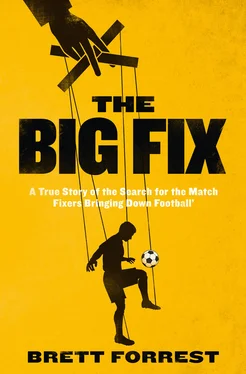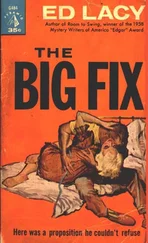For Cindy and Eric, who got me back in the game
Cover
Title Page
Dedication
CHAPTER 1
CHAPTER 2
CHAPTER 3
CHAPTER 4
CHAPTER 5
CHAPTER 6
CHAPTER 7
CHAPTER 8
CHAPTER 9
CHAPTER 10
CHAPTER 11
CHAPTER 12
CHAPTER 13
CHAPTER 14
CHAPTER 15
CHAPTER 16
CHAPTER 17
CHAPTER 18
CHAPTER 19
CHAPTER 20
CHAPTER 21
CHAPTER 22
CHAPTER 23
CHAPTER 24
CHAPTER 25
CHAPTER 26
CHAPTER 27
CHAPTER 28
CHAPTER 29
CHAPTER 30
CHAPTER 31
CHAPTER 32
CHAPTER 33
CHAPTER 34
CHAPTER 35
CHAPTER 36
CHAPTER 37
CHAPTER 38
CHAPTER 39
CHAPTER 40
Acknowledgements
Copyright
About the Publisher
KHALID BIN MOHAMMED STADIUM
SHARJAH, UNITED ARAB EMIRATES, MARCH 2011
The FIFA operatives arrived at the stadium past noon, prepared to disrupt the crime that was tearing football apart. Sharjah was a short drive up the road from Dubai, but it felt like a world away, in the unglamorous dust, a face of the United Arab Emirates that most Westerners never saw. Unlike Dubai, Sharjah didn’t look like a place where someone could get rich overnight. This made it a fitting location for the criminals who had infiltrated the game of football. Their specialty was illusion, and events in Sharjah were about to give them another lucrative ninety-minute return.
The match set for that day – March 26, 2011 – was an exhibition, or friendly, between the national teams of Kuwait and Jordan. It was the sort of game that took place hundreds of times each year around the world, with limited notice and consequence. National team coaches often looked upon these contests as little more than vigorous practice. Interested criminal groups from Southeast Asia to Eastern Europe, on the other hand, considered them the cornerstones of an extensive commercial enterprise.
Now Kuwait versus Jordan was forming into the front line in a gathering war. On one side were organized criminal syndicates, which were making hundreds of millions of dollars – if not billions, the total amount a drop in the opaque, trillion-dollar pool of football betting – by manipulating game results. On the other side were football administrators, who were beginning to accept that match-fixing was the stunning sports scandal of our time, a fundamental threat to the most popular game in the world.
FIFA (Fédération Internationale de Football Association), football’s international governing body, had received information that a collection of known criminals had arranged to manipulate the outcome of the Sharjah match. This was no great surprise, as inflated final scores, questionable penalty calls, and strange betting patterns had been occurring with great frequency in recent seasons. What was novel about this Sharjah match was the fact that FIFA, directed by a newly hired security chief, was operating a clandestine investigation. The time had come to take action.
When the two FIFA investigators entered Khalid Bin Mohammed Stadium, shortly before game time, there was no one else there. It had been a challenge to gather reliable information about the match, even for FIFA, which had sanctioned the competition. The date, the kickoff time, the location – all were in doubt. The websites for the Kuwaiti and Jordanian teams provided conflicting information. Gambling websites did as well. Some sources even listed the match as having been canceled. That’s what it looked like to the two FIFA men as they passed through the wide-open stadium gates. Nobody was selling tickets. The stands were empty. The FIFA investigators took seats in the grandstand, and they noticed that there were no TV cameras or production vehicles present. The match had not been advertised in the local press. In an age of constant coverage and information, it felt like this game was going to take place only in the imagination.
Eventually, the players filtered into the stadium, as did a few fans. Several men milled about on the edge of the playing field, and the FIFA operatives took particular notice of them. They recognized the men, one from an Emirati promotional company, another from a similar firm in Egypt. They had helped arrange the match, though they were ultimately incidental to FIFA’s investigation. Instead, FIFA was interested in the architects of this fix, a notorious group from Singapore, which operated unchecked in dozens of countries across the world. The FIFA investigators noticed two known Singaporean fixers enter the stadium and take seats in the VIP stands. The match was set to begin.
The Sharjah fix had originated in the mind of the most prolific match-fixer in the world, a man of mysterious movements who had manipulated hundreds of matches in more than sixty countries, making untold sums for the syndicate in Asia. But the syndicate had betrayed him. Police had discovered details of the Sharjah fix sketched on a piece of paper lying on his hotel room bed in a Finnish town along the Arctic Circle.
This information had led FIFA’s investigators to Sharjah. They planned, at halftime, to barge in unannounced to the locker rooms of the players and officials, threatening suspension – or prosecution – unless the second half was contested honestly. But although the two FIFA men had attempted to contact officials from the UAE Football Association, their calls and emails had gone unreturned. For now they were relegated to the stands, without the proper credential to visit other areas of the stadium. They speculated that some of the UAE football officials may have knowledge of the upcoming fix. Plenty of national football federations around the world had gone into the lucrative business of fixing with the Singapore syndicate itself.
The purpose of match-fixing was betting fraud. Fixers compromised players, directing them to allow the other team to score. Fixers bribed referees to hand out red cards and penalty kicks, thus influencing the outcomes of matches. The syndicate placed bets based on the timing of these planned events. The fixers defrauded both the bookmaker, who was always one step behind them, and the fan, who believed that what he was watching was real. There was also the player, often coerced into participating. When play began between Kuwait and Jordan, activity on the international betting market revealed that the fix was in.
At some point in the 1990s, Joseph “Sepp” Blatter, the president of FIFA, began characterizing the numerous football players and administrators around the world, collectively, in his public comments, as the “football family.” FIFA, headquartered in Zurich, is the organization that is responsible for staging the World Cup every four years. Among the patchwork of federations and confederations that control and administer football, FIFA carries the most weight. It is the organization that most football people petition in order to solve a dispute, or to dispense a handout. But FIFA is hardly the guardian of goodwill that Blatter’s benevolent terminology suggests. FIFA is registered in Switzerland as a charity, yet it does not operate as a traditional nonprofit organization, with its income of $1 billion per year and its multifarious corporate sponsorship deals and TV contracts. Nor does FIFA behave like a modern business, with standard corporate checks and balances. Instead, it resides somewhere in the imprecise middle, and for some of its top executives this has been just fine, ambiguity being the facilitator of exploitation.
In the last decade, the imprecise way that global football is administered has exposed it to crisis. Match-fixing has overtaken the sport. It is not the fault of FIFA that international organized crime has targeted football. But considering the criminal nature of match-fixing, Blatter’s words have assumed a new meaning. This is football’s modern “family”:
Читать дальше











